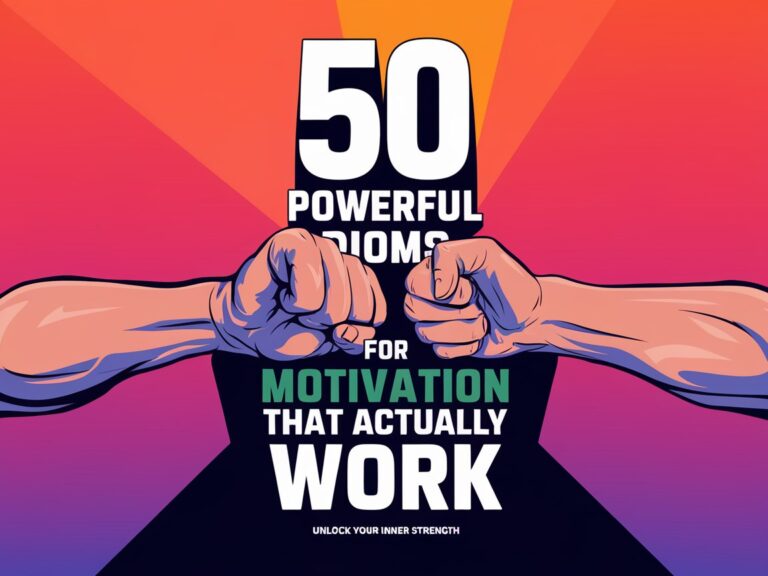50 Teamwork Idioms That’ll Make You Sound Like a Pro

Working well with others isn’t just about being nice – it’s about knowing how to communicate effectively. Idioms for teamwork are powerful phrases that help you express collaboration, support, and shared goals in ways that resonate with people. Whether you’re leading a project at work, playing on a sports team, or just trying to get your family organized, these expressions will make you sound more natural and confident.
The Science Behind Great Teamwork
Before we dive into these game-changing idioms, let’s look at what research tells us about teamwork. Studies show that collaborative problem-solving leads to significantly better outcomes than individual efforts. Dr. Patrick Laughlin from the University of Illinois found that “groups of size three, four, and five outperformed the best individuals” when tackling complex problems.
Even more impressive, McKinsey research revealed that teams with diverse backgrounds show 35% improved creativity and performance compared to more homogeneous groups. This data proves what many of these idioms have been saying for centuries – we really are stronger together.
| Teamwork Benefit | Research Finding |
|---|---|
| Problem-solving effectiveness | Groups of 3-5 outperform individuals |
| Creativity boost | 35% improvement with diverse teams |
| Burnout reduction | 50% of employees report less stress with better teamwork |
1. Two Heads Are Better Than One
This classic saying means that two people working together can solve problems more effectively than one person alone. It’s perfect when you want to suggest collaboration or brainstorming.
When to use it: During meetings when you want to encourage partnership or when someone’s struggling with a challenge.
“Hey, I’m stuck on this budget report. Want to take a look? You know what they say – two heads are better than one!”
2. Many Hands Make Light Work
This idiom emphasizes how tasks become easier when multiple people contribute. It’s one of the most encouraging phrases for getting people to pitch in.
The beauty of this expression is that it makes helping feel rewarding rather than burdensome. It suggests that everyone’s contribution matters, no matter how small.
3. All Hands On Deck
Originally from sailing, this phrase means everyone needs to help with an urgent task. It creates a sense of urgency and shared responsibility.
Pro tip: Use this when deadlines are tight or when you need maximum effort from your team. It signals that normal roles don’t matter – everyone needs to contribute.
4. We’re All In This Together
This powerful phrase creates unity and shared ownership of both challenges and successes. It’s particularly effective during difficult times or major changes.
“I know this project seems overwhelming, but we’re all in this together. Let’s figure it out as a team.”
5. There’s No ‘I’ In Team
While sometimes used with humor, this idiom emphasizes that individual glory shouldn’t come before team success. It’s a gentle reminder about priorities.
When not to use it: Avoid this phrase if someone just made a legitimate individual achievement. Timing matters!
6. Team Player
Calling someone a “team player” is high praise – it means they work well with others and put group goals first. This isn’t just an idiom; it’s a character trait employers actively seek.
Research shows that being labeled a team player can significantly impact career advancement opportunities.
7. On The Same Page
This means everyone understands and agrees with the plan or direction. It’s essential for avoiding miscommunication and ensuring alignment.
“Before we start, let’s make sure we’re all on the same page about our objectives.”
8. Pull Your Weight
This idiom means doing your fair share of the work. It’s a direct but professional way to address unequal contribution without being confrontational.
Use carefully: This phrase can sound accusatory, so frame it positively when possible.
9. Shoulder To Shoulder
Working “shoulder to shoulder” means standing together as equals, facing challenges as a united front. It creates imagery of solidarity and mutual support.
This phrase works especially well in crisis situations or when facing external competition.
10. Pull Together
When teams “pull together,” they coordinate their efforts toward a common goal. The imagery comes from teams of horses or oxen pulling a heavy load.
“If we pull together on this marketing campaign, we can exceed our targets.”
11. A Well-Oiled Machine
This describes a team that works smoothly and efficiently, with each member knowing their role perfectly. It’s the ultimate compliment for team performance.
Example scenario: “After six months of practice, our customer service team runs like a well-oiled machine.”
12. In Sync
Being “in sync” means working in perfect harmony, with timing and coordination that looks effortless. It’s often used to describe teams that have developed excellent chemistry.
13. The Ball Is In Your Court
This tennis-inspired idiom means it’s someone’s turn to take action or make a decision. It’s a polite way to transfer responsibility while maintaining team spirit.
Pro tip: Use this to empower team members and encourage ownership of tasks.
14. Burn The Midnight Oil
Working late into the night to meet deadlines or complete important projects. While not always ideal for work-life balance, it shows dedication during crucial periods.
“We’ll need to burn the midnight oil to get this proposal ready for tomorrow’s presentation.”
15. Have Someone’s Back
This means providing support and protection for a teammate, especially during difficult situations. It builds trust and loyalty within teams.
The phrase creates a sense of security that encourages people to take calculated risks and speak up with ideas.
16. Rise To The Occasion
When team members “rise to the occasion,” they exceed expectations during challenging moments. It’s about stepping up when it matters most.
This idiom is perfect for acknowledging exceptional performance under pressure.
17. Rally The Troops
Originally military, this means motivating and organizing team members for a big effort. Leaders often use this when they need to energize their teams.
“Sales are down this quarter – it’s time to rally the troops and turn things around.”
18. Dream Team
A group of people who work together perfectly, often with complementary skills. It’s the highest praise you can give a collaborative group.
Fun fact: This term became popular after the 1992 U.S. Olympic basketball team, which featured legendary players working in perfect harmony.
19. Win As A Team
This emphasizes that success belongs to everyone, not just standout individuals. It reinforces the value of collective achievement over personal glory.
20. Lift Each Other Up
Supporting and encouraging teammates, especially during setbacks. This phrase creates a culture of mutual empowerment and resilience.
“Great teams don’t just work together – they lift each other up when things get tough.”
21. Stand By Someone
Showing loyalty and support, particularly when a teammate is facing criticism or challenges. It demonstrates the kind of trust that high-performing teams require.
22. Pitch In
Contributing help or effort to a group task. It’s casual and friendly, making it easy to ask for assistance without seeming demanding.
Usage tip: This works great for volunteer situations or when asking for optional help.
23. Divide And Conquer
Breaking a large task into smaller parts that different team members can handle. It’s both a strategy and an idiom that makes overwhelming projects manageable.
24. Put Our Heads Together
Combining mental resources to solve a problem. This phrase emphasizes the intellectual collaboration that leads to innovative solutions.
25. Together We Stand, Divided We Fall
Unity creates strength, while division leads to weakness. This powerful phrase is perfect for moments when team cohesion is being tested.
Historical context makes this idiom particularly impactful – it’s been used by everyone from Aesop to Abraham Lincoln.
26. Work Hand In Hand
Close cooperation and coordination between team members. The physical imagery suggests seamless collaboration and mutual support.
“Marketing and sales need to work hand in hand to increase our conversion rates.”
27. Win-Win Situation
An outcome where all parties benefit. This phrase helps frame collaboration as mutually beneficial rather than competitive.
Pro tip: Use this when proposing partnerships or collaborative solutions to build enthusiasm.
28. Team Effort
Acknowledging that success came from everyone working together. It’s a simple but powerful way to share credit and reinforce collaborative values.
29. In The Same Boat
Facing the same challenges or circumstances as others. This creates empathy and shared understanding within teams.
“We’re all in the same boat with this budget cut – let’s figure out how to adapt together.”
30. Circle The Wagons
Coming together defensively to protect the group from external threats. While originally from pioneer days, it’s now used for strategic team unity.
Modern usage: Often applied to companies or teams facing outside criticism or competition.
31. March To The Same Beat
Everyone following the same rhythm or approach. This idiom emphasizes coordination and shared timing in team efforts.
32. Carry The Load
Taking on a significant portion of the team’s responsibilities. It’s often used to acknowledge someone who’s doing more than their share.
33. Weather The Storm
Working together to survive difficult periods or challenges. This nautical metaphor creates imagery of teams as crews navigating rough seas.
“If we weather this storm together, we’ll come out stronger on the other side.”
34. Team Spirit
The enthusiasm, loyalty, and camaraderie that binds team members together. It’s both something teams have and something they can build.
Research shows that teams with high team spirit have significantly lower turnover rates and higher job satisfaction.
35. Go The Extra Mile
Doing more than what’s required or expected. In team contexts, it means contributing beyond your basic responsibilities for the group’s benefit.
36. Stand Shoulder-To-Shoulder
Similar to “shoulder to shoulder,” this emphasizes equality and mutual support among teammates. It suggests that no one stands alone.
37. All For One, One For All
Each person works for the collective good of the whole group. Made famous by “The Three Musketeers,” it’s still powerful for modern teams.
38. Birds Of A Feather Flock Together
People with similar interests or characteristics often work well together. While sometimes used negatively, it can describe natural team chemistry.
Application: Use this to explain why certain team combinations work particularly well.
39. Take One For The Team
Making a personal sacrifice for the group’s benefit. This phrase should be used carefully, as it can imply unfair burden-sharing.
40. Row In The Same Direction
Everyone working toward the same goal with coordinated effort. The rowing metaphor emphasizes both unity of purpose and synchronized action.
41. Link Arms
Coming together in solidarity and mutual support. This phrase creates powerful imagery of people physically connecting to face challenges.
“When the going gets tough, successful teams link arms and push forward together.”
42. Share The Load
Distributing work and responsibilities equitably among team members. It’s about fairness and preventing burnout through collaboration.
43. Back Each Other Up
Providing support and assistance when teammates need help. This creates psychological safety and encourages people to take appropriate risks.
44. Move Mountains Together
Accomplishing seemingly impossible tasks through collective effort. This hyperbolic phrase works great for motivating teams facing big challenges.
45. Sing From The Same Song Sheet
Everyone delivering the same message or following the same approach. It’s particularly useful for ensuring consistent communication from teams.
British origin: This phrase is more common in UK English but increasingly used internationally.
46. Pool Resources
Combining individual assets, skills, or knowledge for greater collective impact. It emphasizes the multiplication effect of team collaboration.
47. Join Forces
Combining separate efforts into a unified approach. Often used when different teams or departments need to collaborate on special projects.
“Let’s join forces with the product team to solve this customer issue once and for all.”
48. Close Ranks
Coming together defensively to protect the team from external criticism or threats. It suggests loyalty and mutual protection among members.
49. United We Stand
A shortened version of the classic phrase that emphasizes strength through unity. It’s particularly powerful during times of organizational change or challenge.
50. Fire On All Cylinders
Working at maximum efficiency with every team member contributing fully. This automotive metaphor suggests peak performance and optimal coordination.
“When our development team fires on all cylinders, we can launch features twice as fast as our competitors.”
Frequently Asked Questions
Q: When should I use teamwork idioms in professional settings?
A: Use them to build rapport, motivate teams, or explain collaborative concepts. They work especially well in meetings, team-building activities, and when giving feedback. Avoid overusing them or using ones that might confuse non-native speakers.
Q: Are teamwork idioms appropriate for international teams?
A: Some idioms translate well across cultures, while others don’t. Stick to simpler, more universal phrases like “team player” or “work together” with diverse international teams. When in doubt, explain the meaning.
Q: How can idioms improve team communication?
A: Idioms create shared understanding, break down formality, and can lighten tense situations. They help build team culture and make communication more relatable and memorable.
Q: Should managers use different teamwork idioms than team members?
A: Managers should focus on inclusive, motivating idioms that empower rather than demand. Phrases like “let’s put our heads together” work better than “pull your weight” when coming from leadership positions.
Q: What’s the difference between teamwork idioms and clichés?
A: Clichés are overused expressions that have lost impact, while effective idioms still convey meaning powerfully. Use idioms sparingly and choose ones that fit your specific situation rather than defaulting to the most common phrases.
The Hidden Power of Teamwork Language
Here’s something most articles won’t tell you: the idioms you choose actually shape how your team thinks about collaboration. When you consistently use phrases that emphasize mutual support like “lift each other up” or “have someone’s back,” you’re not just describing teamwork – you’re actively creating a culture where those behaviors become normal.
Neuroscience research suggests that the metaphors we use literally influence how our brains process concepts. So when you describe your team as a “well-oiled machine,” you’re programming everyone to think about efficiency and smooth coordination. When you talk about “weathering storms together,” you’re building mental resilience for tough times.
The most successful teams don’t just use these idioms – they live them. They become part of the team’s identity and show up in how members actually treat each other. That’s the real magic of mastering teamwork language: it doesn’t just help you communicate better, it helps you become the kind of team that others want to join and clients want to work with.
Remember, great teamwork starts with great communication, and great communication often starts with the right words at the right time.
Helpful Resources
- https://www.atlassian.com/blog/teamwork/the-importance-of-teamwork
- https://foundr.com/articles/leadership/teamwork
- https://leverageedu.com/explore/learn-english/idioms-for-teamwork/
- https://idiominsider.com/idioms-for-teamwork/
- https://idimosfinder.com/idioms-for-teamwork/
- https://5minuteenglish.com/mastering-professional-english-idioms-for-the-workplace/
- https://www.linkedin.com/pulse/14-idioms-teamwork-collaboration-mosalingua-bcnoe
- https://www.apu.apus.edu/area-of-study/business-and-management/resources/why-it-is-necessary-to-improve-team-communication/
- https://blog.elsaspeak.com/en/understanding-and-using-idioms-in-english-why-its-important/
- https://5minuteenglish.com/work-and-career-idioms-to-navigate-professional-english/
- https://www.skillshare.com/en/blog/what-is-an-idiom-and-how-do-you-use-it/






